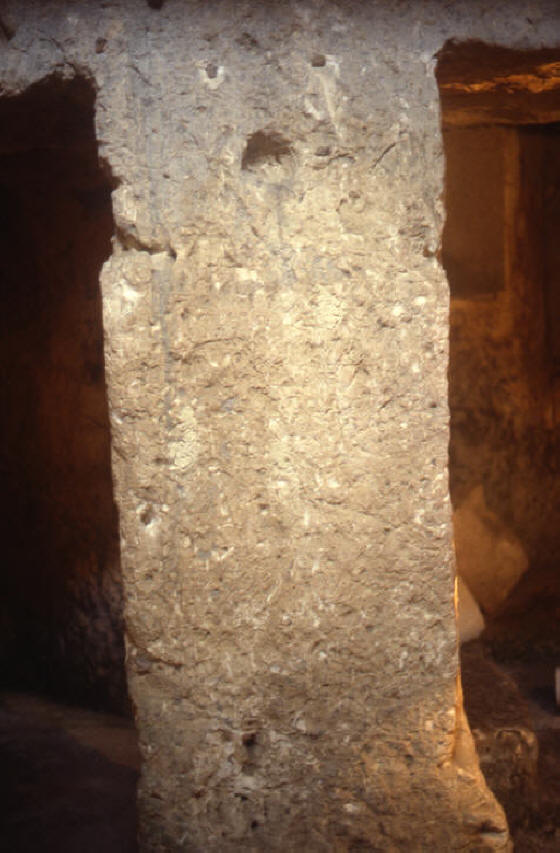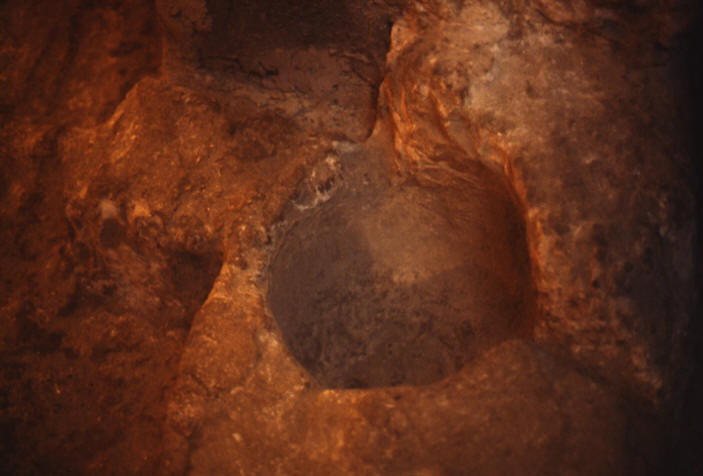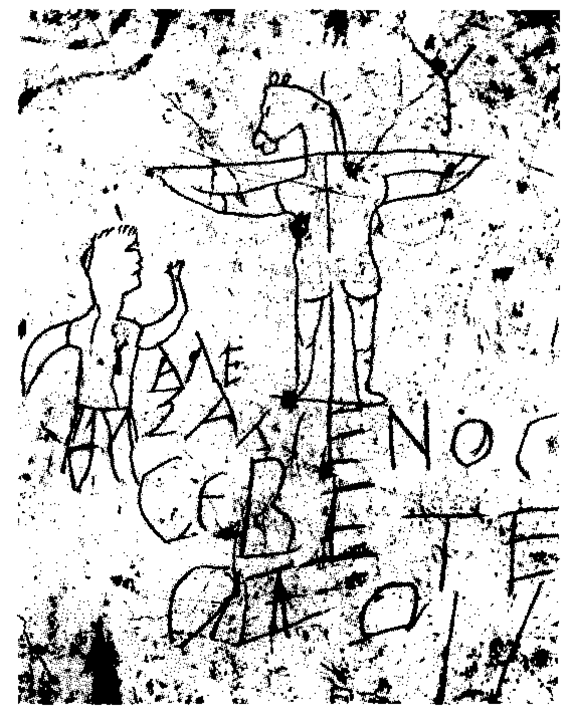

“The Sounds of Lent:
Flogging, Mocking, and Spitting”
Matthew 27:26-30
Click for Audio
![]()
Pastor Kevin Vogts
Trinity Lutheran Church
Paola, Kansas
Lenten Vespers III—March 20, 2019
“The Sounds of Lent: Flogging”
In the Name of the Father and of the Son and of the Holy Spirit.
Amen.
Perhaps the most sickening sound in the passion story is the sound of
flogging: “Pilate had Jesus flogged and handed him over to be crucified.”
This is a modern reproduction of the instrument of torture known as a
scourging whip, which was used by the Romans for flogging their victims.
It had several leather thongs, braided with iron balls, as in this example, or
bits of sharp, broken pottery or bone.

Flogging with such a scouring whip was used by the Romans as a form of
punishment in itself. The book of Acts reports the first Apostles, and
later Paul and Silas, being flogged by the authorities because of their
preaching about Christ.
The flogging Jesus endured was a particularly severe flogging that was
usually administered by the Romans just before crucifixion. It seems hard
to believe, but a healthy crucifixion victim could linger on the cross three or
four days before finally dying. So, to speed up the process, they were
first flogged almost to point of death. Crucifixion actually publicly
completed the execution which really began with their flogging.
Excavations at Jerusalem have uncovered what we believe to be the high
priest’s palace where Jesus was taken after he was arrested in the Garden of
Gethsemane. In the basement, or really it was the dungeon, is this prison
cell. If this actually is the high priest’s palace from that era, as many
archaeologists agree it is, it is likely that Jesus was held in this very prison
cell while awaiting trial. This doorway into the cell was cut through
later by archaeologists.

Originally it was just a deep chamber carved into the bedrock under the
palace, without any openings on the side walls. The prisoners would be
lowered down on ropes, and then the ropes removed. This made escape impossible,
and avoided the need for installing expensive doors or iron bars. Jesus
would have actually been lowered into the cell through this hole in the ceiling.

Jesus was not flogged here, but later, by Pontius Pilate.
However, in this cell there is a whipping post from that era, which was used to
flog prisoners. Jesus would have been tied around a post just like this,
facing the post with his back exposed.

Carved into the floor is a bowl, used to hold saltwater, into which the
whip was dipped, to perversely increase the pain, as with every stroke the salt
would sting in the wounds.

Ironically, considering the torture they were administering, this
whipping post has a small depression for the victim’s nose.
We deserved this torture which Jesus endured on account of our sin.
As a Lenten hymn says, “Who is it Lord, that bruised you? Who has so sore
abused you, and caused you all this woe? We all must make confession of
sin and dark transgression. . . I caused your grief and sighing . . .
’Tis I who should be smitten.”
Amen.
“The Sounds of Lent: Mocking”
It is very ironic that the earliest known depiction of Christ upon the cross is not a work of Christian art, glorifying Christ, but rather this mocking piece of graffiti.

It was discovered in 1857, carved into the floor of an ancient army
barracks near the emperor’s palace at Rome. It seems one of the soldiers
there, named Alexamenos, was a Christian. The graffiti shows this faithful
soldier kneeling before a cross. On the cross hangs a naked man—but with a
donkey’s head. The sarcastic inscription says, “Alexamenos worships his
god.”
It was about 150 years prior to this blasphemous graffiti being drawn
in a barracks at Rome, that Roman soldiers in another barracks, at Jerusalem,
had gathered around to blasphemously mock Christ himself: “Then the governor’s
soldiers took Jesus into their headquarters and gathered the whole company of
soldiers around him.”

“They stripped him and put a purple robe on him, and then twisted
together a crown of thorns and set it on his head. They put a staff in his right
hand and knelt in front of him and mocked him. ‘Hail, King of the Jews!’ they
said.”
The Roman Empire had recently taken away from local authorities the
power to carry out executions, and restricted the right of capital punishment to
their own representatives, such as Pontius Pilate, the Roman governor of the
province of Palestine. So, if Jesus’ enemies wanted him put to death, they had
to find some crime that would be a violation of Roman law, weighty enough to
warrant the death penalty.
“And they began to accuse him, saying, ‘We found this man subverting
our nation. He opposes payment of taxes to Caesar, and claims to be Christ, a
king.’” They hit all hot buttons, the three worst possible crimes in the
Roman Empire: subversion; advocating non-payment of taxes; and, most seriously,
claiming to be a king, in opposition to Caesar. In fact, Rome had recently
passed another law, specifically making it treason, a capital offense punishable
by death, for anyone to proclaim themselves a king without prior permission of
the Roman Emperor.
Pilate interviewed Jesus on this last, most serious charge, and he
understood that Jesus was not talking about an earthly kingdom, but a spiritual
kingdom: “‘Are you the king of the Jews?’ . . . ‘Yes, it is as you say,’ Jesus
replied. . . . ‘But my kingdom is not of this world’ . . . From then on,
Pilate tried to set Jesus free, but the Jews kept shouting, ‘If you let this man
go, you are no friend of Caesar. Anyone who claims to be a king opposes
Caesar.’”
No Roman governor wanted to be accused of being soft on treason against
Caesar! And so, even though Pilate knew Jesus was innocent, he allowed
Jesus to be crucified for this supposed crime of proclaiming himself an earthly
king in opposition to Caesar.

That is why the sign posted above Christ on the cross, to announce the
crime for which technically he was being crucified, proclaimed: “Jesus of
Nazareth, King of the Jews.” In Latin that is, “Jesus Nazarenus Rex
Judaeorum,” and abbreviated in Christian art as “INRI,” which also appears atop
the cross on our altar.
And that is why the soldiers mock Jesus in the particular manner they
do. The purple robe, reserved only for nobility in the Roman Empire; the
crown of thorns; the staff like a king’s scepter; and bowing before him, not
sincerely, but in scornful, sarcastic, mocking tribute, “Hail, King of the
Jews.”
Jesus knew in advance exactly what would happen to him, the
humiliations he would endure. He told his disciples, “We are going up to
Jerusalem, and everything that is written by the prophets about the Son of Man
will be fulfilled. He will be handed over to the Gentiles. They will mock
him, insult him, spit on him, flog him and kill him.”
So, why did Jesus allow it to happen? As he hung dying, the crowd
around the cross continued to mock him: “Save yourself! Come down from the
cross, if you are the Son of God!” And Jesus could have done that; he
could have saved himself; he could have spared himself all these humiliations.
As he said in the Garden of Gethsemane, “Do you not know I can call on
my Father, and he will at once put at my disposal more than twelve legions of
angels? But how then would the Scriptures be fulfilled that say it must
happen in this way?” As Psalm 22, which we read earlier, prophesied, “I am
a worm and not a man, scorned by men and despised by the people. All who
see me mock me and hurl insults.”
Why did he submit to these shameful humiliations? He was
suffering the disgrace, the contempt, the shame that you deserve because of your
sins. Jesus willingly endured all this mocking and humiliation for you, to
earn the salvation of your soul.
Humble yourself before the Lord. Confess to him your sins, your
guilt. Because of his humiliation, because of his death on the cross,
because of his resurrection, your sins are all forgiven, your guilt is all
canceled.
Blindfolded, slapped, beaten, ridiculed, mocked, sarcastically robed
and crowned and hailed as the King of the Jews, sneered at, insulted, exposed
naked on a cross. All of it endured for you. As Paul says in
Philippians, “He humbled Himself and became obedient unto death—even death on a
cross!” He humbled himself for you.
Amen.
“The Sounds of Lent: Spitting”
There are certain words which are called onomatopoetic, meaning the
word comes from imitating a sound. There are dozens of onomatopoetic words
in English, such as buzz, meow, hiccup, and hum. And there are several
onomatopoetic words in the story of Jesus’ suffering and death: whip, slap,
sneer, and SPIT.
Since ancient times, spitting at someone, especially in the face, has
been considered the worst possible insult. Both groups of soldiers who
guarded Jesus, the Hebrew temple guards and the Roman soldiers, shamefully
treated him in this worst possible way: “Then they spit in his face and struck
him with their fists . . . Again and again they struck him on the head
with a staff and spit on him.”
Isaiah prophesied this degrading treatment which our Lord would endure:
“I offered my back to those who beat me . . . I did not hide my face from
mocking and spitting.”
How would you react if someone treated you as they did Jesus, mocking,
slapping, spitting in your face? Perhaps you won’t literally receive that
kind of treatment physically, but you do often endure that kind of treatment
emotionally.
Jesus told his followers, “I say to you . . . love your enemies,
do good to those who hate you, bless those who curse you, and pray for those who
mistreat you. If someone strikes you on one cheek, turn to him the other
also.” And he taught his followers to pray, “Forgive us our trespasses, as we
forgive those who trespass against us.”
Jesus himself practiced what he preached. For, even as he was
being nailed to the cross, he cried out, “Father, forgive them, for they know
not what they do.”
Paul says in Colossians, “As God’s chosen people, holy and dearly
loved, clothe yourselves with compassion, kindness, humility, gentleness and
patience. Bear with each other and forgive whatever grievances you may
have against one another. Forgive as the Lord forgave you.”
Learn from Jesus, who cried out for forgiveness even for those who
mercilessly mocked him, and slapped him, and spit in his face, to be patient in
suffering, affliction, and persecution, to pray for your enemies, and to forgive
even those who grievously trespass against you.
Amen.
Return to Top | Return to Sermons | Home | Email Church Office